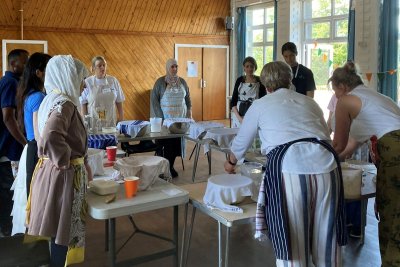Sustain / Real Bread Campaign / Articles
The language of loaf
What happens when you try to share bread making skills with a group of people without a shared language? Jo Lancaster found out.

One warm Wednesday in July 2022, I was invited by the Healthy Hyde Primary Care Network in Greater Manchester to teach sourdough bread making with a group of refugees attending an ESOL (English for Speakers of Other Languages) programme.
Heathy Hyde works across eight GP practices, covering a population of around 72,000 people. They are working on several projects, one of which is a focus on health inequalities and population health. This project uses social and other interventions designed to help improve the health and wellbeing of people living in the area.
New challenge
I reduced my usual 13-page course note document to three and enlisted Mandy, a wonderful baker who once attended a course and now helps me run them. I loaded my VW Beetle with all the ingredients and equipment we would need, including dough ready to bake. We worked out a basic ice-breaker and I had decided to demonstrate making focaccia and bake a loaf from dough I’d made earlier, then use these as the basis of lunch. I wanted the structure to feel equal, knowing that I would learn as much as I was teaching and so constructed the day in a way that I hoped would achieve this. I brought a huge variety of ingredients in the hope that the group would work together to make a buffet.
I run my microbakery, JoJangles Pizza and Bread, and one-day classes from home in the Peak District, so this was a new challenge, even though my pre-baking career was in housing and social care. People in the group had eight different mother languages, including a young woman from Syria called Rim, who was deaf and had not attended the ESOL classes. I was told that she wouldn’t go anywhere without her mother, would have difficulty communicating and probably wouldn’t engage.
Food, flavours, fun
Words cannot adequately convey the energy and camaraderie that comes with lovely people coming together to learn and make food as a group. Without common language we quickly realised that ingredients are sniffed and senses are used in a much better way. Instead of the spoken word, there was lots of smiling and hand gestures, as well as staring into people’s eyes to try to fathom what each other wanted to say! And it worked. We made and ate bread together. Photos can do no justice to what was created on that special day – the food, the flavours, the fun.
After the event, Sally Culmer, who works for Healthy Hyde, wrote on Facebook: “Bread doesn’t care about nationality or language barriers, all it needs to make it special is love, care and attention.”
Laughter
I will remember Rim forever as, very quickly disproving what I had been told, she communicated that she had helped her mother make the tiny, exquisite baklava they brought as a gift for the group. It was the best I have ever eaten. Rim found that the ricotta, kindly donated by Yorkshire Dama Cheese, was similar to the labneh her mother made. Together they created a herby salad using the ricotta and we all enjoyed something I have not eaten before.
By the afternoon, Rim shone. She called her dad on FaceTime so I could say hello to him. At one point she was in fits of laughter with a woman from China – without speaking a word of each other’s languages, they had agreed that the dough on the bench looked like bums! The next day I had a text from Healthy Hyde to say that Rim had attended an ESOL class for the first time– on her own!
Amazing and inspiring
I am a firm believer that sourdough is magic and it was apparent in spades that day. A couple of people in the group clearly had a natural affinity with dough, making it looked effortless to them. Everyone made a loaf to take home to refrigerate overnight and bake the next day. They refreshed and took home starters as well as all the ingredients to make a second loaf at home. Mandy and I just loved how the group instinctively worked together to tidy up, with everyone helping. At the end of the session, the Heathy Hyde wellbeing practitioner said to me: “I have never seen them so happy.”
I’m told that the rest of the ESOL course group were a bit miffed to miss the day that the others were raving about and so I will be going back to do a big old surplus food cook up which we can all share for lunch. Rim and her mother have agreed to teach the group to make baklava. Zoe from China wants a session to teach people how to make her dumplings and I will teach baguette making at some point and possibly yeasted buns.
I have huge gratitude to Healthy Hyde for asking me. It is SO amazing to have health professionals who innovate like this and recognise value beyond pharmaceutical prescriptions. It was genuinely one of the very best work days I have ever had. Amazing, inspiring and a very real reminder that vibrant communities everywhere are made up of people who make the effort to work together even if language is the last thing they share.
@jojo_jangles
@healthyhydeteam
Originally published in True Loaf magazine issue 52, October 2022
Published Monday 6 March 2023
Real Bread Campaign: The Real Bread Campaign finds and shares ways to make bread better for us, better for our communities and better for the planet. Whether your interest is local food, community-focussed small enterprises, honest labelling, therapeutic baking, or simply tasty toast, everyone is invited to become a Campaign supporter.

